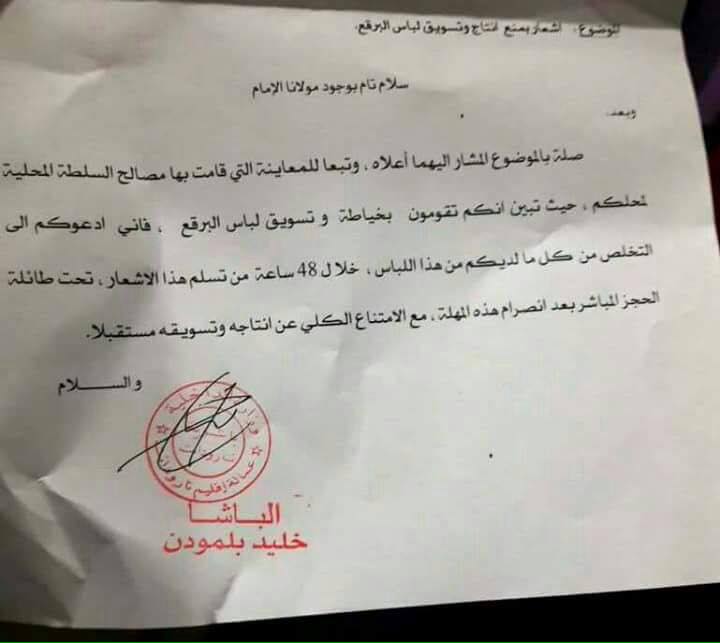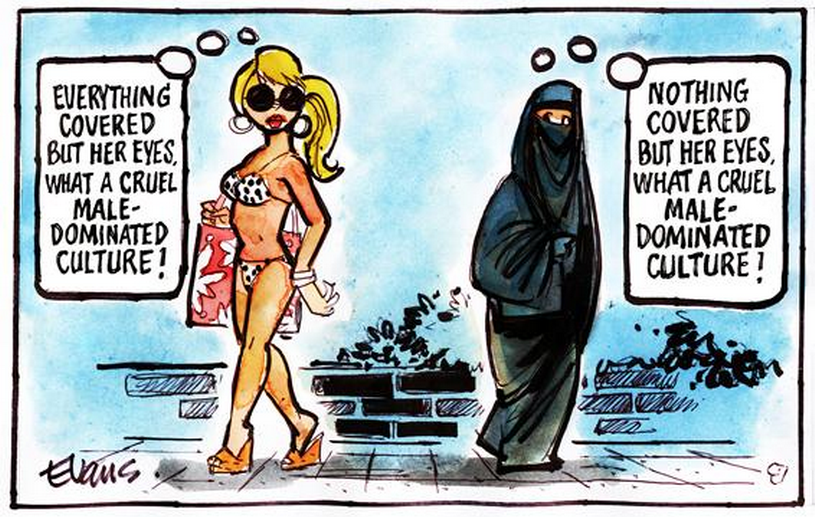
Casablanca, Morocco- While Moroccans have been waiting eagerly for anti-corruption associations and the Ministry of Interior to expose money embezzlers, corrupt politicians, and opportunistic officials, and to enforce laws which will diminish and ideally exterminate corruption in a country wreck by all kinds of unethical practices, civil servants working for said Ministry distributed leaflets that instructs tailors and retailers to stop the production, distribution and sale of Burqas.

Pro-burqa-ban enthusiasts, principally comprised of regime supporters and extremist secularists, atheists, and feminists, hailed the decision with unusual zeal, describing it as one step ahead towards breaking free from “backwardedness, extremism, and women’s oppression”. They also noted that the ban is a necessity in a country whose safety and security is more important than any other consideration. Others, however, have advanced an entirely different argument, while remaining in favor of the Burqa ban; they posit that Burqa is a culturally-imported piece of cloth that threatens to annihilate the Moroccan culture and its customs. In this view, Burqas should be banned to safeguard the Moroccanity of the society from any foreign threat, they argue. While the arguments advanced by pro-burqa-ban supporters may seem sound in the sense that they bear some truth in them, their flaws can so effortlessly be pinpointed.
Arguing that the Burqa is foreign to the Moroccan culture, and henceforth must be banned, is utter stupidity, for, following this line of reasoning, we would then be calling for the ban of clothes imported from Western countries. Again, if we speak about the necessity of burqa-ban to Morocco’s security, since those who veil themselves may commit crimes and get away with it, we would be, once again, immersed in a senseless, non-productive line of thought as those who commit crimes usually veil themselves, either using helmets, hats, or any other garment that covers the face. Even some traditional Moroccan clothes may be used to commit crimes, like the traditional Moroccan Haye’k.
Anti-burqa-ban supporters, on the other hand, a fraction that includes Muslims (both extremists and moderate), liberal secularists, atheists, and feminists; stand firmly against this verdict, deeming it a direct attack against humans’ rights and freedoms. Some, particularly Muslims, went as far as to describe it as an assault against Islam, though there is no reference to Burqa in the Quran. The problem with this argument, again, does not lie in the advanced argument per-se, but in those who are using it at the moment; Muslims. Calling for the respect of humans’ rights and freedoms does not imply that they should only speak, when the victims are affiliated to Islam are under attack; but they should speak even when non-Muslims are concerned, especially when it comes to cases of dress-code-imposition. In other words, they should avoid cherry-picking. (They shun freedoms and rights when they are not in favor of their system of beliefs, but would so fiercely argue under their shadow if they serve their ideologies.)
In my modest opinion, I believe that anyone may follow any ideology he wants. People must not forget that it is of vital importance to respect and not restrict the freedoms and rights of individuals. For this reason, I am against the ban of the Burqa.


